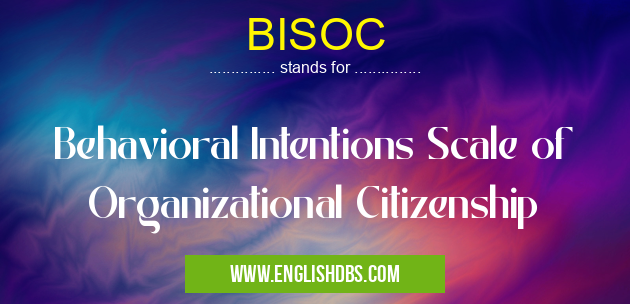What does BISOC mean in UNCLASSIFIED
BISOC stands for Behavioral Intentions Scale of Organizational Citizenship. It is a questionnaire that measures an individual's willingness to engage in organizational citizenship behaviors (OCBs). OCBs are voluntary, discretionary behaviors that benefit the organization and its members, but are not part of an individual's formal job responsibilities.

BISOC meaning in Unclassified in Miscellaneous
BISOC mostly used in an acronym Unclassified in Category Miscellaneous that means Behavioral Intentions Scale of Organizational Citizenship
Shorthand: BISOC,
Full Form: Behavioral Intentions Scale of Organizational Citizenship
For more information of "Behavioral Intentions Scale of Organizational Citizenship", see the section below.
Components of BISOC
BISOC consists of 18 items that assess six dimensions of OCBs:
- Altruism: Helping others without expecting anything in return.
- Conscientiousness: Taking initiative and going beyond what is expected.
- Sportsmanship: Accepting setbacks and criticisms gracefully.
- Courtesy: Being polite and respectful to others.
- Civic Virtue: Participating in organizational activities and decision-making.
- Self-Sacrifice: Putting the needs of the organization ahead of one's own.
Administration and Scoring
BISOC is typically administered through a self-report questionnaire. Respondents are asked to indicate their level of agreement with each item on a 5-point Likert scale (1 = strongly disagree to 5 = strongly agree).
The total BISOC score is calculated by summing the scores for all 18 items. Higher scores indicate a greater willingness to engage in OCBs.
Applications
BISOC has been used in various research and organizational settings to:
- Measure OCBs in employees
- Identify factors that influence OCBs
- Develop interventions to promote OCBs
- Predict employee performance and organizational outcomes
Essential Questions and Answers on Behavioral Intentions Scale of Organizational Citizenship in "MISCELLANEOUS»UNFILED"
What is the Behavioral Intentions Scale of Organizational Citizenship (BISOC)?
The BISOC is a scale used to measure an individual's intentions to engage in organizational citizenship behaviors (OCBs), which are discretionary behaviors that benefit the organization as a whole.
What are the different types of OCBs measured by the BISOC?
The BISOC measures three types of OCBs:
- Helping behavior: Helping colleagues with their work, providing support, and offering assistance.
- Sportsmanship behavior: Accepting organizational decisions and changes without complaint, and cooperating with others.
- Organizational loyalty: Being committed to the organization and its goals, and speaking positively about it to others.
How is the BISOC scale used?
The BISOC scale typically consists of a series of questions or statements that individuals respond to using a Likert scale. Respondents indicate their level of agreement with each statement regarding their intentions to engage in OCBs.
What are the benefits of using the BISOC scale?
The BISOC scale provides valuable insights into an individual's willingness to engage in OCBs, which can have positive implications for organizational effectiveness. Managers and researchers can use this information to:
- Understand employees' attitudes towards OCBs
- Identify individuals with high OCB intentions
- Develop strategies to promote OCBs within the organization
Are there any limitations to the BISOC scale?
Like any measurement tool, the BISOC scale has some limitations. It relies on self-reporting, which may introduce bias or inaccuracies. Additionally, the scale may not capture all aspects of OCBs and may vary in effectiveness across different cultural contexts.
Final Words: BISOC is a well-validated instrument for measuring OCBs. It provides valuable insights into the factors that motivate individuals to engage in these behaviors and can be used to improve organizational performance and employee satisfaction.
